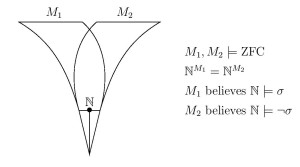This will be a talk for the New York Philosophical Logic Group, November 10, 2014, 5-7pm, at the NYU Philosophy Department, 5 Washington Place, Room 302.
Abstract. This talk — a mix of mathematics and philosophy — concerns the extent to which we may infer definiteness of truth in a mathematical context from definiteness of the underlying objects and structure of that context. The philosophical analysis is based in part on the mathematical observation that the satisfaction relation for model-theoretic truth is less absolute than often supposed. Specifically, two models of set theory can have the same natural numbers and the same structure of arithmetic in common, yet disagree about whether a particular arithmetic sentence is true in that structure. In other words, two models can have the same arithmetic objects and the same formulas and sentences in the language of arithmetic, yet disagree on their corresponding theories of truth for those objects. Similarly, two models of set theory can have the same natural numbers, the same arithmetic structure, and the same arithmetic truth, yet disagree on their truths-about-truth, and so on at any desired level of the iterated truth-predicate hierarchy. These mathematical observations, for which I shall strive to give a very gentle proof in the talk (using only elementary classical methods), suggest that a philosophical commitment to the determinate nature of the theory of truth for a structure cannot be seen as a consequence solely of the determinateness of the structure in which that truth resides. The determinate nature of arithmetic truth, for example, is not a consequence of the determinate nature of the arithmetic structure N = {0,1,2,…} itself, but rather seems to be an additional higher-order commitment requiring its own analysis and justification.
This work is based on my recent paper, Satisfaction is not absolute, joint with Ruizhi Yang (Fudan University, Shanghai).

